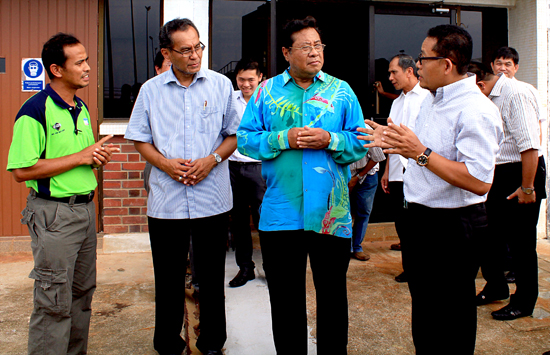KUALA SELANGOR, 24 Mar: The project to upgrade the Phase 1 of the Sungai Selangor Water Treatment Plant which is expected to be fully completed on 31 March this year will increase water supply by 190 million litres per day (MLD) to be distributed to consumers in the state.
This increase in production capacity will ensure that places in Klang such as Meru, Kapar and Kapar Indah, will no longer face water disruptions.
According to the Chief Minister, Tan Sri Abdul Khalid Ibrahim, the project which began on 1 March 2012 at a cost of RM50 million was implemented because previously, the plant did not produce water at an optimal rate.
“The plant is supposed to be capable of producing 950 MLD per day but only produced 750 MLD, thus causing water shortages.
“If water shortage problems occur in the near future, it would only clearly reflect the incompetency of the Selangor Water Supply Company (Syabas – Syarikat Bekalan Air Selangor Sdn Bhd) in undertaking work to supply water to consumers,” said Abdul Khalid.
He said this yesterday after receiving the briefing and visited the site of the Phase 1 Sungai Selangor Water Treatment Plant.
Abdul Khalid also said that the State Government has also taken several other measures to increase the capacity of raw and treated water to meet the demands of the consumers in the state.
Among the measures taken is to conduct a research to increase the raw water source from Sungai Selangor by developing a ‘Hybrid Off River Augmentation System’ (HORAS) and to study the ability of groundwater capacity through the ‘River Bank Filtration’ method.
The State Government is also undertaking projects to improve the clean water pumping system to the Bukit Mayong Pool Balance to increase the production capacity of the pump house involved.
Meanwhile, the Sungai Damansara Plant located at Shah Alam will also be reactivated.
Abdul Khalid also added that the State Government will seriously look into ways to reduce the current ‘Non-Revenue Water’ (NRW) rate of 33 percent through research.
“If the NRW can be reduced by 10 percent, we can provide an additional 400 MLD to consumers,” said Abdul Khalid.

